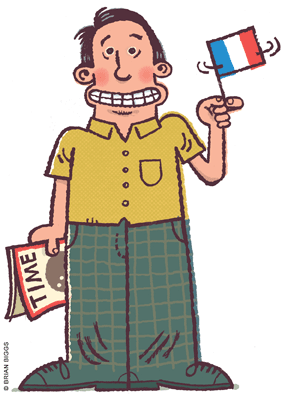
How to lose friends, alienate people, and wind up getting bear hugs.
By Donald Morrison | After too many years of late nights at the office, pointless jousts with semi-competent bosses and tedious budget meetings beneath buzzing fluorescents, I finally decided to quit working full-time and—it’s a cliché, I know—move to Paris. Pourqois pas? The City of Light is a bastion of high culture. You can barely walk down a boulevard here without tripping over a chamber music concert, a film première, an art-show opening, or a revival of Racine. My culture-loving wife and I were in heaven.
Then something happened. Today I am reluctant to step outside my apartment. I fear people will recognize me, and not in a good way. You see, nearly nine years after arriving in France, I have acquired a certain notoriety. Throughout the land, from dinner parties to book fairs to television talk shows, I am known as The Man Who Killed French Culture.
I didn’t mean to do it. Having left an exhausting career as an editor at Time magazine, where I had worked since graduation, I was looking forward to a quiet life of occasional writing in a land that had welcomed generations of American scribblers. My former colleagues, however, had other ideas. Three idyllic years after my departure, I was invited back for a nice lunch not far from my last office, in London. My friends and I rambled pleasantly through old times and triumphs until dessert arrived, whereupon my successor as European editor got to the point. Would I take on an assignment dreamed up by him and a few colleagues, all of them Franco-skeptic Brits? The subject: France’s decline as a cultural force in the world.
I politely declined. I was an all-purpose hack specializing in politics, business, and car crashes, I insisted, not a cultural expert. Besides, anybody who lives in France for more than 15 minutes knows that art, music, literature, and the rest are thriving. Culture has been a source of French pride and diplomatic strategy since the days of the kings. As a French official boasted some years ago, “The Germans may have Siemens; we have Voltaire.” Today France takes the arts more seriously and subsidizes them more heavily than any country in the world. Much as I would welcome a nice freelance fee, in euros, I said there was simply no story here.
My host frowned, reached for the check, and asked me to think it over. As we parted, I’m sure I heard him mumble something ominous about my budding freelance career. It was then, for the first time in years, that I thought of the young Hemingway, living in Paris on an uncertain stream of dollars from American magazines. I too earned my uncertain keep this way. But unlike Hemingway, I faced a punitive, ever-worsening exchange rate.
I returned to Paris and started digging. What I found surprised me. Of course, France dominated the international cultural scene in the 19th and early 20th centuries. Hugo, Zola, and Balzac were read the world over. Debussy, Ravel, and Satie were similarly celebrated. France was the birthplace of Impressionism, Cubism, Fauvism, Surrealism, and other major isms. Same for film (a French invention), photography (ditto), drama, architecture, poetry … France ruled the cultural firmament.
Nowadays, however, the country’s cultural achievements go largely unheralded abroad. Works by French contemporary artists command less at international auction, on average, than those of Americans, Germans, Brits, and, increasingly, Chinese. New books by French authors are no longer widely translated; of the 1,000 or so published every fall as part of the famous literary rentrée, barely a dozen make it to the other side of the Atlantic, or even across the English Channel. New French drama is rarely performed outside France, and French movies have lost the cachet they enjoyed in the era of Godard and Truffaut. Heard any serious French music lately? The same goes for pop and rock, which are dominated by Americans and Brits. Quick, name a French pop star who’s not Johnny Hallyday. (Groomed by the French government in the 1970s as a home-grown alternative to Elvis, he’s still a sensation in France—and virtually unknown outside.)
I accepted the assignment, of course. I talked to French publishers, editors, authors, musicians, artists, and gallery owners. I perused white papers from government culture commissions, reports from entertainment industry associations, and books by French cultural critics. The inescapable conclusion: French culture, though thriving at home, is vastly unloved everywhere else.
The reasons are diverse. To start with, French is a language fewer and fewer people speak. The international “buzz” machine—that infrastructure of publications, websites, conferences, publicists, and other megaphones for promoting culture—is a firmly Anglophonic realm. France’s university system is a shambles and, at its best, geared more toward producing engineers and civil servants than writers, artists, and musicians. And, paradoxically, the subsidies and protectionist measures with which France nurtures its cultural industries have produced an insular mediocrity.
I proposed some remedies: producing more movies and music in English for the global market; putting more emphasis on the arts in schools; reducing the government’s role in cultural decision-making; encouraging more private support for the arts; empowering France’s marginalized racial and ethnic minorities to help re-energize the national culture. Nothing that hasn’t been tried successfully in other countries, including the US.
My findings were published as a 3,000-word cover story in my old magazine, which sells a few thousand copies in France. I thought the article would pass largely unnoticed.
My Paris telephone started ringing the day the issue hit the news kiosks. In interviews with several journalists, I detected a note of hostility that surprised me. My previous contacts with them, and French people generally, had been a warm bath of amity. Besides, pretty much everything I reported had already been said by French observers, or was boringly obvious. Surely, I thought, the French would take my recommendations in the positive spirit with which they were intended. Bonne chance.
I was pilloried in nearly every major French newspaper and magazine. Leading scholars, publishers, and government officials were enlisted to refute my assertions. French journalists overseas were directed to find local evidence that their country’s culture was thriving. (I was pleased at the meager results.) My own country’s ambassador to France issued a statement that I was dead wrong (thanks, pal). Bernard-Henri Lévy, France’s leading celebrity-intellectual, was commissioned to fillet me in the pages of Britain’s The Guardian (he politely turned the discussion toward America’s declining influence abroad).
The problem was not just my article, but the words my editors had, without warning me, put on the magazine’s cover: “The Death of French Culture.” A wild overstatement. Nowhere did I write that French culture was dead or even approaching its sell-by date. But they wanted to shift magazines, and that they did. The issue sold in record numbers. Several French journals asked me to write further on the subject, among them the Foreign Ministry’s own cultural monthly. Nearly every major French television channel invited me to explain myself on air.
Unexpectedly, I had become a genuine French personnage, recognized by maitres d’hotel and saluted on the stairs by my heretofore silent neighbors with the shocked curiosity you’d accord a famous murderer. I was beginning to enjoy my Warholian 15 minutes of fame.
Which, to my eventual chagrin, has become an eternity. Nearly four years after the article appeared, I am still regularly invited to bloviate about French culture at conferences, on television chat shows, and in the pages of respectable journals. It is mortifying. A leading French publisher commissioned me to expand my original article into a book, which appeared two years ago. It was savaged by critics as shallow and ill-informed. The publisher then asked for a book about France’s love affair with Barack Obama, out this year and also dismissed by reviewers.
They may have a point. If I sounded mildly convincing in a magazine piece on the rather narrow question of French influence in the world, on the larger subject of French culture I remain a dilettante in a sea of anoraks. Despite three years of undergraduate French, I read the language with difficulty and speak it without sense or syntax. I can manage a few words in conversation about the vacuity of French novels in general, but I have read embarrassingly few of them in particular. I remain shamefully innocent of the classics of French civilization. I struggle to tell Saint-Beuve from Saint-Simon, Audiard from Abelard, Caron de Beaumarchais from Choderlos de Leclos. When asked, I fudge as best I can, changing the subject to something obvious and hoping I am not found out.
Oddly, my ignorance hardly seems to bother the French. Chat-show hosts and conference moderators are surprisingly indulgent, letting me babble incoherently without ripping me to ribbons, 60 Minutes-style. Audiences rush up afterward to profess violent disagreement—and charm at my American accent. Still, I can see the truth in their faces. They know I’m over my head, living a lie, making it up as I go along.
So I keep mostly to myself these days. I surf the Internet looking for stray bits of information—mostly in English—about French culture. A language tutor comes once a week, but he has nearly reached the limits of exasperation. I still receive invitations for conferences and chat shows, but I try to limit my appearances to those that offer free Champagne. I know that my hosts know that I am a fraud, and their indulgent persistence is excruciating. They must enjoy watching me squirm.
One aspect of French culture I have lately come to appreciate is the unexpected warmth of its practitioners. I have been thoroughly and publicly discredited by genuine experts who thereupon invite me for coffee, for dinner, and to lecture their students. A cultural bureaucrat who lost his job shortly after my article appeared, perhaps because of it, greets me with smiles and a bear hug when I run into him. It’s as if the same people who so robustly criticized my original effort four years ago don’t really mind that I hardly know what I’m talking about.
Indeed, faking it seems to be a national sport. French politicians and diplomats are distinguished more for their brazen self-confidence than the rigor of their policies. French universities are refreshingly casual about the academic qualifications of their lecturers. French talk shows are full of over-the-hill crooners and curvy starlets holding forth with charming ignorance on politics, science, and literature. Such behavior may explain the popularity of French scholar Pierre Bayard’s 2008 bestseller, How to Talk about Books You Haven’t Read. I devoured the tome, expecting a riotous, tongue-in-cheek satire. But the guy is mostly serious.
All this makes me wonder if the French know something I don’t. Perhaps their vaunted cultural greatness is built on myth—a shrewd, centuries-old marketing campaign. Maybe French culture dominated the world for so long not because it was better than anybody else’s, but simply because the French convinced us it was. They had better packaging and a larger promotion budget. As far back as Louis XIV’s day, these snake-oil merchants created a brand and have maintained it for generations, even as the product itself grew shopworn.
As I was writing that last paragraph, my phone rang. It was a French magazine editor inviting me to a roundtable discussion of—guess what? I tried to wiggle out of it, explaining that I was just an ordinary journalist, that my knowledge and language skills were not up to the task. He insisted, adding that the Champagne would flow freely.
And so, a few days from now, I shall stand before yet another friendly firing squad. Once more I will feel like a fraud. But this time, just possibly, my self-loathing will be softened by a recent realization. I think I have figured out why my deception has been tolerated for so long: The French, like many people, don’t really listen to what we say. What matters is that we are talking about them.
Donald Morrison C’68 teaches writing at the Institut d’Études Politiques. He is the author of The Death of French Culture and How Obama Lost America (Editions Denöel). He is currently at work on a book with Ann Morrison G’68 on life in Paris.




